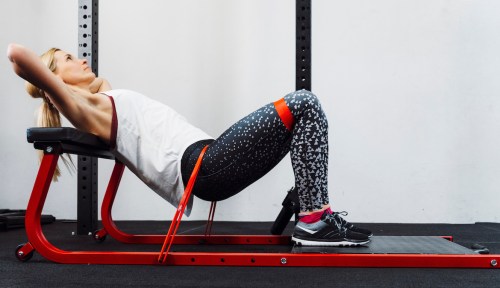Our editors independently select these products. Making a purchase through our links may earn Well+Good a commission
Feeling backed up from time to time is a fairly universal experience. In fact, the occasional bout of constipation can happen for all sorts of reasons. Maybe you’re traveling and are off your normal poop schedule. Or maybe you skipped your fiber-filled morning smoothie, which usually helps you “go.” Odds are, your body gets itself back on track eventually.
Experts in This Article
gastroenterologist and assistant professor of clinical medicine at the Lewis Katz School of Medicine at Temple University, Philadelphia
But if you find yourself counting the days since your last BM, and realize it’s been a little too long, you may have chronic constipation. Why does this happen? And are there ways to get your gut moving again?
Here’s a closer look at reasons why you’re chronically backed up, plus the best natural remedies for constipation and when it’s time to see a doctor.
What is chronic constipation?
Constipation happens when you have stools that are hard, dry, lumpy, and painful or difficult to pass, or when you have the feeling like you still have to poop but nothing’s coming out. If you’re regularly having these symptoms or are having fewer than three bowel movements per week, it’s considered chronic, or long-term constipation, says Neena Mohan, MD, gastroenterologist and assistant professor of clinical medicine at the Lewis Katz School of Medicine at Temple University in Philadelphia, Pennsylvania.
Things that can make you chronically constipated
Sometimes chronic constipation comes down to certain lifestyle factors. You may have a harder time pooping if you frequently do any of the following, per the Mayo Clinic:
- Don’t drink enough water
- Eat a low-fiber diet (or eat a lot of foods that cause constipation, like red meat or fried food)
- Are mostly sedentary (moving your body keeps the stuff in your gut moving, too)
- Don’t go to the bathroom when you have the urge to poop
Certain medications or supplements can also be to blame. Some medications that may cause constipation as a side effect include prescription pain relievers (like morphine), antidepressants, anti-seizure medications, antipsychotics, and mineral supplements like iron or calcium, according to May 2018 paper in Medicine1.
Chronic constipation can also stem from an underlying health condition, says Dr. Mohan. Some common culprits include the following:
- Anxiety
- Diabetes
- GI tract blockage, including colon cancer
- Irritable bowel syndrome (IBS)
- Pelvic floor muscle weakness
- Pregnancy
- Neurologic conditions like multiple sclerosis (MS), Parkinson’s disease, spinal cord injuries, or stroke
- Underactive or overactive thyroid
It’s also possible to have chronic idiopathic constipation, which is basically constipation with no known medical or structural cause, says Dr. Mohan. (In other words, everything looks totally fine when your doc checks you out, but you’re still constipated.) This problem is surprisingly common, affecting up to 17 percent of people worldwide, according to an October 2021 review in Clinical and Experimental Gastroenterology2.
Just keep in mind: Chronic constipation from a health condition is likely to come with other symptoms. If that’s your case, call your doctor so they can help figure out the underlying cause.
How to treat chronic constipation
If you feel like you’re always backed up, or are straining to “go” on the toilet, there are some basic poop-friendly behaviors you can incorporate into your daily routine. Some tips from Dr. Mohan are:
1. Eat more fiber
The recommended daily amount of fiber for the average adult is between 25 and 38 grams, but most people get way less than this, per Harvard Health Publishing. Eating a high-fiber diet can help keep your gut regular, by bulking up and softening stool as it moves through your intestines, according to the Mayo Clinic.
You can up your fiber intake by adding more fibrous foods to your diet, including the following, per the Mayo Clinic:
- Fruits
- Veggies
- Beans
- Whole grains
- Nuts and seeds
A tip: Focus on increasing your fiber slowly (like, having a piece of fruit with breakfast for a few days, then adding beans to your salad, etc.). Adding a lot of fiber too quickly may actually make your constipation worse, says the Mayo Clinic.
2. Drink more fluids
Especially while increasing your fiber intake, it’s important to stay properly hydrated. Drinking enough water can help fiber work its magic, and offers constipation relief by moving poop more smoothly through your GI tract. While everyone’s hydration needs are slightly different, the general recommendation is to get anywhere between 11 and 15 cups per day, through drinking or eating water-rich foods (think: watermelon), per the National Academies of Sciences, Engineering, and Medicine.
3. Move more throughout the day
Getting enough exercise is not only great for your overall health—it’s also great for your gut. In fact, greater physical activity is associated with lower rates of constipation, according to an October 2018 study in the American Journal of Gastroenterology3. Try to get at least 30 minutes of moderate-intensity exercise most days of the week, per Dr. Mohan.
4. Try a fiber supplement
If you’re finding it difficult to get enough fiber through food alone, a fiber supplement may help. You can find over-the-counter (OTC) options at most pharmacies or grocery stores—some brands include Metamucil, FiberCon, or Citrucel. These supplements add bulk to your stool so it’s softer and easier to pass. They also tend to be pretty gentle, according to Dr. Mohan, so they’re a good first supplement option to try.
5. If all else fails, try a laxative (with doctor approval, of course)
Adding an OTC laxative can help if lifestyle changes aren’t cutting it, says Dr. Mohan. They can also be helpful if you have an underlying GI condition that causes constipation (like Crohn’s disease, for example). After talking with your doctor, you can pick from a few options, including the following, per the Cleveland Clinic:
- Osmotic laxatives like MiraLAX, ExLax, or milk of magnesia. These draw more water into your colon to make your poop softer (so make sure to drink plenty of water while taking them).
- Stimulant laxatives like Dulcolax are a last OTC resort. They activate the nerves in your colon to move poop out, so they’re more likely to cause symptoms like cramping or urgency.
Sometimes, your doctor may recommend a prescription-strength laxative if you have a long-term health issue that causes constipation, or if you’re taking a medication that makes it harder to poop (like antidepressants). You can work with your doctor to decide the best option for you.
Can chronic constipation cause any health complications?
As if feeling bloated and gross every day wasn’t enough, long-term constipation can have a few health effects, too. For example, trying to force out poop may cause the following, per the Mayo Clinic:
- Hemorrhoids
- Tears around your anal tissue (called anal fissures)
- Rectal prolapse (where some of your rectal tissue has slipped out of your anal opening)
Long-term constipation can also lead to fecal impaction—where hard poop backs up into your colon—which can be super painful and make it hard to eat. In rare instances, fecal impaction could even cause a blockage in your colon that increases the risk for appendicitis, says Dr. Mohan. This is why it’s important to let your doctor know about your symptoms.
When to see a doctor
Most of the time, chronic constipation can be cleared up by making lifestyle changes or trying out OTC supplements or laxatives. Though in rare instances, chronic constipation that’s not healed with natural remedies can signal an underlying health problem—like colon cancer, a GI disorder, or fecal impaction. According to Dr. Mohan, you should see your doctor if:
- Your constipation lasts for more than three weeks
- Your symptoms are very severe
- You have rectal bleeding and rapid weight loss, which could be a sign of an underlying GI disorder
And if you’re in severe pain, are bleeding, have a fever, or are vomiting, it’s best to seek emergency medical care.
FAQ
Can chronic constipation cause acid reflux or GERD?
Chronic constipation doesn’t cause acid reflux or gastroesophageal reflux disease (aka GERD, which is reflux that happens regularly). But they often show up together, perhaps because both problems can be caused by certain lifestyle habits. In fact, a 2004 Neurogastroenterology & Motility4 study found that 28 percent of people with GERD also reported having constipation.
Can chronic constipation cause nausea or vomiting?
In most cases, no. But if your constipation is bad to the point where it causes hard poop to back up into your colon, then it can. Nausea is a common symptom of fecal impaction, per the Cleveland Clinic. If you haven’t pooped in a long time, and feel pain, bloating, and nausea, it’s best to call your doctor and seek emergency medical care.
Can chronic constipation cause diverticulitis?
Diverticulitis is a condition where the small pouches in your GI tract can become inflamed or infected. Some common risks for diverticulitis include low-fiber diets and chronic constipation, per the Mayo Clinic. Your doctor can do a CT scan of your abdomen to figure out whether you have diverticulitis.
Can chronic constipation cause colon cancer?
Constipation doesn’t causecolon cancer. (Cancer happens when mutated cells in the colon begin to multiply and grow out of control.) But any change in bowel habits, including constipation, can be a sign of colon cancer. Other possible symptoms include rectal bleeding, ongoing abdominal pain, weakness or tiredness, or losing weight without trying, according to the Mayo Clinic.
Plus, it’s worth noting that some of the risk factors for constipation, such as eating a low-fiber diet and not being very active, are also risk factors for colon cancer, per the Mayo Clinic. So if you have any of these symptoms, it’s important to bring them up to your doctor. They can do a colonoscopy to check the inside of your colon for any abnormalities.
—reviewed by Jennifer Logan, MD, MPH
Forootan M, Bagheri N, Darvishi M. Chronic constipation: A review of literature. Medicine (Baltimore). 2018 May;97(20):e10631. doi: 10.1097/MD.0000000000010631. PMID: 29768326; PMCID: PMC5976340.
↩︎Bassotti G, Usai Satta P, Bellini M. Chronic Idiopathic Constipation in Adults: A Review on Current Guidelines and Emerging Treatment Options. Clin Exp Gastroenterol. 2021 Oct 22;14:413-428. doi: 10.2147/CEG.S256364. PMID: 34712055; PMCID: PMC8547593.
↩︎Atsawarungruangkit, Amporn MD; Hussain, Zilla MD. Relationship Between Constipation and Physical Activity: Results From the National Health and Nutrition Examination Survey (NHANES): 459. American Journal of Gastroenterology 113():p S266-S267, October 2018.
↩︎Locke GR 3rd, Zinsmeister AR, Fett SL, Melton LJ 3rd, Talley NJ. Overlap of gastrointestinal symptom complexes in a US community. Neurogastroenterol Motil. 2005 Feb;17(1):29-34. doi: 10.1111/j.1365-2982.2004.00581.x. PMID: 15670261.
↩︎
Sign Up for Our Daily Newsletter
Get all the latest in wellness, trends, food, fitness, beauty, and more delivered right to your inbox.
Got it, you've been added to our email list.











